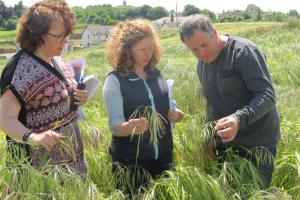AFBI's advice on Black grass and brome grass in Northern Ireland
Date published:
Black grass (Alopecurus myosuroides) is a serious problem weed in cereal crops in England with crop losses of up to 75% being common in populations where it has become established.

Black grass reduces crop yields through competition for nutrients, especially nitrogen. Herbicide resistant Black grass has been confirmed in 34 counties in England and has also been detected in Scotland. In the last couple of years there have been instances of Black grass reported in crops in Northern Ireland and it is well established in some areas.
The most effective methods of control are cultural - including delayed drilling, higher seeding rates, competitive varieties, spring cropping and fallowing. These recommended control methods are generally common agricultural practice in Northern Ireland and Black grass is not yet widespread here. However, there is unease amongst growers, seed merchants and the Ulster Farmers Union that seed of Black grass could come into Northern Ireland on straw and in seed lots from the rest of the UK and Ireland and thus become more established.
Whilst Black grass poses a threat in the future, more recently brome grasses have become increasingly common in Northern Ireland cereal crops. There are 5 species of brome grass found in Northern Ireland and as different control measures apply to different species, identification is important. All species can reduce yield and quality with a density of only 3 plants per square metre causing over 2% yield loss in winter wheat. Yield reduction from plant competition is the greatest impact but high populations will also cause lodging (and subsequent yield loss). Unshed seed will contaminate the combine and baled straw and spread the problem across the farm and onto other farms.
Recently, AFBI and CAFRE have been offering advice to growers on the most effective forms of control to use. This information has been presented online and at the 2017 Arable Conference which was attended by over 250 growers and can be accessed by contacting CAFRE or AFBI.
Notes to editors:
AFBI carries out high quality technology research and development, statutory, analytical, and diagnostic testing functions for DAERA and other Government departments, public bodies and commercial companies. AFBI's Vision is to Advance the Local and Global Agri-food Sectors Through Scientific Excellence.All media enquiries to AFBI Press Office